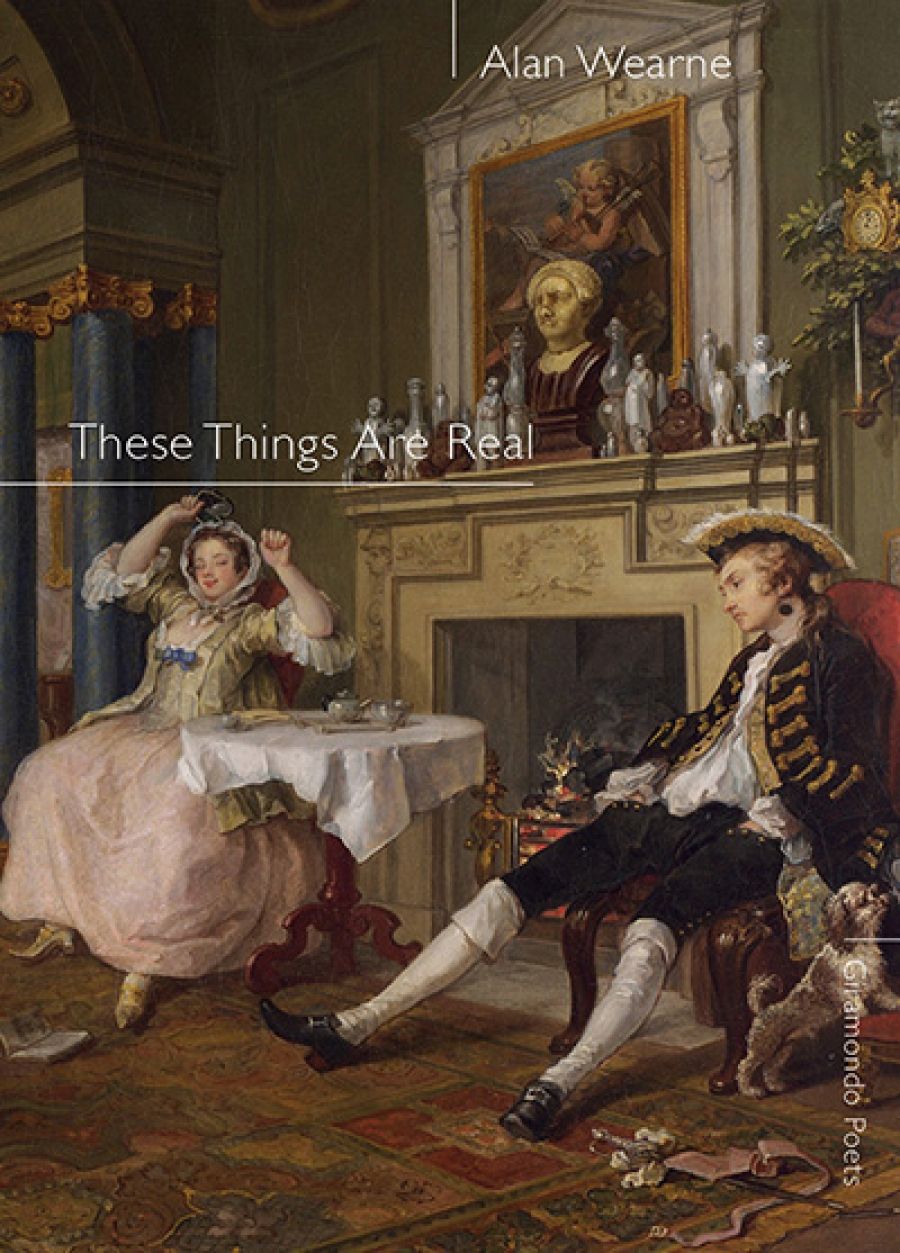
- Free Article: No
- Contents Category: Poetry
- Custom Article Title: Peter Kenneally reviews 'These Things Are Real' by Alan Wearne
- Review Article: Yes
- Online Only: No
- Custom Highlight Text:
Alan Wearne’s work over the past thirty years or so – dense, demanding, unique, rewarding – is like the oeuvre of a cinematic auteur: one that never quite got onto the syllabus, or brought out the crowds at Cinémathèque. Technique above all, most of the time, but allied with real if unfamiliar emotion, even if the narrative needed the reader to have the right ...
- Book 1 Title: These Things Are Real
- Book 1 Biblio: Giramondo, $24 pb, 144 pp, 9781925336320
The first story concerns a widow, Nance, in postwar Moorabbin, reconnecting with her old friend Iris and carrying on a kind of ‘friendship’ with Iris’s husband Keith: unconsummated, hardly even a flirtation, but somehow essential to her. The first thing one notices, in the opening lines, is Wearne’s sleight of hand. Iris, he says, belonged to the ‘generation of unadorned names, / Jean and Elaine, Nance and Wynne.’ There are also Dot, Elwyn, and Gwen. They may be unadorned, but they fall together on the ear in a singular way: the way Alan Wearne hears them. The tuning fork is struck. Even more, in this first story, is the way he gets his characters to speak with his diction. ‘Now call me a sophisticate,’ Nance says, ‘but what sophisticate’s a Moorabbin sophisticate?’ Even though it is hard to imagine a person saying that, Wearne manages to get it out of Nance on the page and still make her utterly quotidian. I had not realised before how much this makes him work.
There are two other female characters, as different as could be. A single mother, in ‘Anger Management: A South Coast Tale’ falls in despite herself with a just-sensitive-enough-to-begin-with failure at everything who soon turns to anger and abuse, ‘a stocky, perspiring man, making noises no one wants / to understand, getting dragged away’. It convinces in an almost too benign way. Rather more laboured, ‘Waitin’ for the Viet Cong’ has a ‘recently retired femocrat’ looking back on a disastrous, almost fatal, flight to Paris in a headlong 1960s pursuit of love and rebellion: only to be saved by, and permanently enveloped in, the way in which one’s family insist on loving, doggedly, infuriatingly, through everything. The story creaks: the emotion does not.
The male characters represent so much that their personalities recede to vanishing point. There is Peter, in ‘Memoirs of a Ceb’, struggling with being gay, somehow finding his way through, in some semi-distant era, so mysterious it retreats before you. And finally, defiantly, in the familiar form of the dishevelled, divorced, ex-junkie ex-teacher remembering a ghastly event from the salad days of his junkiedom, who opens his mouth, for Wearne to speak: ‘So it continues, my tick-off list of / Them them and them, those those and those till it will have happened / much too many years ago, and even these memories, our sour / and blighted memories, must surely need to cease.’
 Alan WearneThe second half of the book is ‘The Sarsparilla Writers Centre’: nearly fifty pages of satire directed at all and sundry. Satire, according to the Concise Oxford, is the ‘use of ridicule, irony, sarcasm etc., in speech or writing, for the ostensible purpose of exposing & discouraging vice or folly’. The brothers Fowler were rightly ambivalent about satire – hence the ‘ostensible’ lurking in the definition, ready to pounce.
Alan WearneThe second half of the book is ‘The Sarsparilla Writers Centre’: nearly fifty pages of satire directed at all and sundry. Satire, according to the Concise Oxford, is the ‘use of ridicule, irony, sarcasm etc., in speech or writing, for the ostensible purpose of exposing & discouraging vice or folly’. The brothers Fowler were rightly ambivalent about satire – hence the ‘ostensible’ lurking in the definition, ready to pounce.
In this case, the purpose is mostly to expose and discourage anyone who has got up Wearne’s nose in the last forty or fifty years, and it’s not especially edifying. There are also a couple of other retrograde tropes on show from the poetry universe: writing poems about other poets; and limp two-line squibs. There are many poets guilty of both, but seldom on this scale. Fun to perform, I daresay, but not to read. There is one, ‘The 1987 Victorian Premier’s Prize for Poetry’, that is genuinely funny, and here it is: ‘What you see is what you get / Runner-up to Lily Brett.’
There is also a completely delightful longer poem called ‘Freely, and with the appropriate sense of space (Dreams: lived, dreamt and composed for Ken Bolton)’. If it is a parody it is a very affectionate one, and full of an uncharacteristic lightness and grace. It works because it doesn’t matter who all the poets paraded past us are, or what exactly Wearne’s grist is: fifty more pages of picaresque Bolton-lite would have been far more refreshing, if a little gassy, than all the indigestible two-liners. However, after some consternation, the realisation dawned that this is how a poet might tweet: especially one so firmly lodged in the pre-Twitter ambience of the bookish, beerish twentieth century fin de siècle. Ephemeral and stolid: it was worth a try, I suppose.


Comments powered by CComment